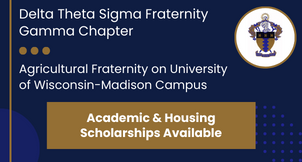January 2018

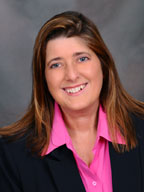
A Message From Your Executive Director…
WSCA leaders are busy preparing for our upcoming conference in February! We are planning all the conference events you love every year as well as rolling out some new ideas. Please plan on joining your colleagues to learn, collaborate and reenergize!WSCA listened to our members and is offering pre-conference sessions based on your interests and needs. Learn more about all the options here . WSCA is offering several FREE preconference opportunities this year.
![]() WSCA is excited to share that we have negotiated an official conference bookstore! The National Center for Youth Issues (NCYI) will be tripling the size of their booth to meet the requests of conference attendees. Learn more about NCYI offerings here.
WSCA is excited to share that we have negotiated an official conference bookstore! The National Center for Youth Issues (NCYI) will be tripling the size of their booth to meet the requests of conference attendees. Learn more about NCYI offerings here.
We can’t wait to see you in February!
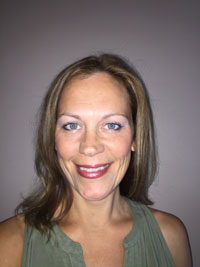
Assistant Board Chair Message
By Angela Goebel, WSCA Board Assistant Chair
It is time for advocates and upstanders. It is time for school counselors. It is time for WSCA 2018 Board Elections! Our Elections Committee is preparing information to share with you about our prospective Board Candidates.
We are entering our third year with a new system for elections. The election format allows current Board Members to select new candidates for the three open Board of Director candidate positions. The elections committee is in the process of reviewing the candidate applications and selecting applicants that will best represent our Wisconsin school counselors.
Our Elections Committee will be looking for school counselors that are interested in having a significant impact on our profession and that will represent the diverse needs and perspectives within our state. Our WSCA membership will vote in February for the slate of new Board Directors candidates. If the membership votes are 85% for “yes”, the election for our three new Board Directors will be complete.
WSCA is a strong and amazing organization with which to be associated. The Board of Directors, in conjunction with our Executive Director and our Committees and Coordinators, works very hard to maintain the strength of the organization. In part, it is through the amazing Board Candidates that are presented every year that we are able to maintain that strength. We look forward to our membership participating in the WSCA elections process.
Please feel free to review the board of directors position description in order to better understand the roles and responsibilities here. Additionally, to build an understanding of the WSCA Board focus, please review the following WSCA ENDS Policies.
Conditions exist so the Wisconsin School Counselors will practice with the highest level of effectiveness.
1. School counselors (active and pre-service) will be knowledgeable about effective school counseling practices.
a. School counselors are knowledgeable about the development, implementation, and evaluation of comprehensive school counseling programs.
b. School counselors are knowledgeable about current ethical and professional practices and their application.
c. School counselors are knowledgeable about current trends in school counseling and education.
i. School counselors are actively engaged in state and national initiatives that impact the school counseling profession.
d. School counselors are knowledgeable about leadership and advocacy principles.
e. School counselors are knowledgeable about culturally responsive practices.
2. Key Stakeholders (including but not limited to) school administrators, policymakers, and community members will understand the impact made by the school counselor implementing a comprehensive school counseling program.

WSCA Advocacy
by Stacy Eslick, Executive Director
WSCA is becoming increasingly involved in state-level advocacy on behalf of school counselors and education. It is a privilege to talk about the work that school counselors do on a daily basis and advocate for our profession. There are a number of upcoming opportunities to have your voice be heard that will impact your schools and work. Please take a moment to read these important updates and share your input.
Last spring, WSCA in collaboration with the WI School Psychologist Association and WI School Social Work Association advocated against certain pupil service licensing recommendations (see letter here).
Due to this advocacy, DPI listened to our professional organizations and did not include recommendations from The Leadership Group on School Staffing to have license reciprocity with clinical mental health professionals and school-based pupil service staff in the PI 34 proposal. Click here to read the full PI 34 proposal
The language DPI is recommending for the PI 34 changes for reciprocity is only for Speech and Language clinicians. All the other pupil services were removed by DPI against the recommendation from the Leadership Group and only include the following.
PI 34 proposed changes
DSPS licensed speech and language pathologists can get a renewable Tier 1 license by virtue of their DSPS licensure. A Tier II license that leads to lifetime licensure can be given to DSPS licensed speech and language pathologists who have completed statutory requirements that apply to all teachers. DSPS licensed audiologists can be given a Tier II license by virtue of their DSPS certification. As audiologists are not teachers they do not need to meet any additional statutory requirements that apply to teachers.
You will see in the official proposal there is no reciprocity or language about allowing dual licensing with community-based counselors, social workers or psychologists. The proposed rule changes are meant to make the licensing process more understandable and increase flexibility while maintaining high-quality staff in Wisconsin schools.
The Department of Public Instruction will conduct five hearings in January to accept public testimony on proposed changes to educator licensing rules (PI 34). In addition to the hearings, a public comment period is open until Jan. 31 with written comments on the proposed permanent rules given the same consideration as public testimony. The hearing dates, times, and locations are as follows:
- January 16, 4 to 6 p.m. — St. Norbert College, Mulva Library, Room 101, 400 Third Street, De Pere;
- January 17, 2:30 to 4 p.m. — DPI Headquarters, GEF 3, Room P41, 125 South Webster Street, Madison;
- January 19, 4:30 to 6:30 p.m. — Milwaukee Public Schools, Auditorium, 5225 West Vliet Street, Milwaukee;
- January 25, 3 to 5 p.m. — CESA 10, Conference Center, 725 West Park Avenue, Chippewa Falls; and
- January 29, 4 to 6 p.m. — University of Wisconsin-La Crosse, Centennial Hall, 3212 Centennial Hall, La Crosse.
Submit a comment to DPI on the proposed changes here http://goo.gl/forms/DnTvOXf6LW3vMAVt2
Additional information is available on the Department of Public Instruction website https://dpi.wi.gov/news/releases/2017/five-hearings-scheduled-proposed-educator-licensing-rules
Read the Current Issue of the Graduate Student Newsletter Here
Elementary-Age Self Regulation Tools
By Amy Kraemer
Many teachers and parents know the struggle that some children have with regulating their emotions. At the elementary school level, there are several resources that school counselors can use on a regular basis. Some of this teaching is done at the classroom level through large group counseling lessons and others are taught through small groups and individual counseling sessions. The resources shared below can also be taught by classroom teachers, school counselors, and even brought home and reviewed by parents/guardians with their children.
Often times, students who lack skills in self-regulation benefit from learning how to recognize the physical signs of their bodies moving from one emotion to the next. This awareness can be learned through the resources below and many other mindfulness activities that help children become aware of their bodies, thoughts, and actions. Helping children recognize that their emotions are connected to their physical feelings can help them slow down the reactions they have to be able to stop, think, and do in a more thoughtful and calm way.
At the end of this article, there is a list of a few self-regulation resources. Here are three of those resources in a little more detail.
The Zones of Regulation – Leah M. Kuypers, MA Ed. OTR/L

The Zones is a systematic, cognitive behavioral approach used to teach self-regulation by categorizing all the different ways we feel and states of alertness we experience into four concrete colored zones. The Zones framework provides strategies to teach students to become more aware of and independent in controlling their emotions and impulses, manage their sensory needs, and improve their ability to problem solve conflicts.
By addressing underlying deficits in emotional and sensory regulation, executive functioning, and social cognition, the framework is designed to help move students toward independent regulation.
Kelso’s Choice Conflict Management – Barbara Clark, Ph.D. & Diane Hipp, CPS
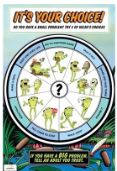
Kelso’s Choice is the leading tool for teaching conflict management skills for children Pre-K through 5th grade. Home of the beloved choice wheel, this conflict resolution curriculum teaches children the difference between big problems and little problems. Kelso the frog is a fun and engaging way for children to learn conflict management.
The MindUp Curriculum – Brain-Focused Strategies for Learning and Living

The benefits of MindUp include the following:
- Help children achieve and maintain focused attention
- Experience children in the class as individual learners with a more accurate view of their talents and challenges
- Respond more thoughtfully and mindfully rather than be reactive when under pressure
- Improve communication with children, parents, and staff
- Develop a classroom climate that is infused with optimism and hope
- Creates a stronger, more vibrant school ethos and culture
- Be happier, more joyful and experience greater job satisfaction
For more information, check out ASCA’s Position Statement on Social/Emotional Development.
WSCPAR
Program of Promise Award Winners
The Wisconsin School Counseling Program Accountability Report (WSCPAR) is a continuous improvement document sponsored by the Wisconsin School Counselor Association. Submitted WSCPAR’s reviewed by the WSCPAR committee scoring above the 24 point cut score receive Program of Promise award. This year, the WSCPAR committee is proud to announce 7 WSCPAR Program of Promise award winners.
Here’s a quick peek at some of their data:
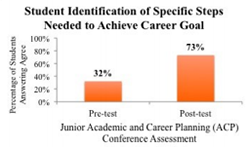 |
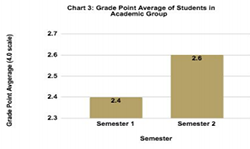 |
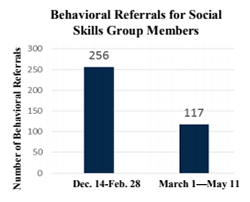 |
||
| Burlington High School Using Academic and Career Planning conferences to meet individually with students and their parents, Burlington’s high school counselors increased skill sets to reach their student’s career goals. |
Forest Park Middle School, Franklin Working with a group of 7thgrade students who were identified on their report card under Success Behavior Habits as lacking time management, organization, and study skills. The school counselor increased overall group grade point averages. |
Willow River Elementary School, Hudson The school counselor decreased first-grade behavior referrals through group work. |
||
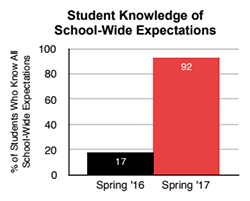 |
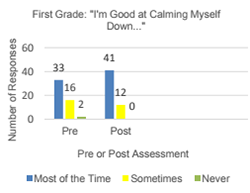 |
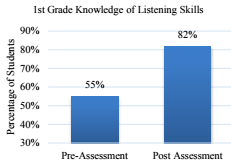 |
||
| Wilson Elementary School, Neenah The school counselor increased student knowledge in knowing the school-wide behavior expectations from only 17% in the spring of 2016 to 92% in the spring of 2017. |
Shady Lane Elementary School, Menomonee Falls Using the MindUp Curriculum, the school counselor taught first-grade students how to calm down and results indicated that it was effective. |
Valley View Elementary School, Menomonee Falls
The school counselor taught Second Step listening skills as a career skill to first graders. Knowledge of listening skills increased from 55% to 82%.
|
||
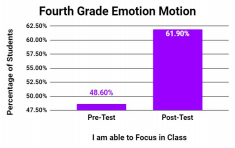 |
||||
|
Sheboygan Falls Elementary and Middle School
Using the Emotion Motion mindfulness curriculum, the school counselor was able to increase student focus in class.
|
Conference Committee
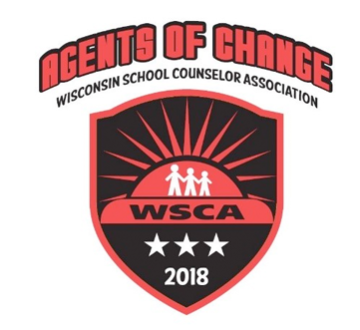
Wisconsin School Counselor Association Annual Conference
February 20-22, 2018
Madison, WI
The WSCA Conference Committee would like to wish you a very Happy New Year! We hope that during a well-deserved break you were able to take time to rest and rejuvenate, as well as finalize plans to attend the 2018 WSCA Conference. Whether you are a returning conference attendee or you are joining for your first time, there is something planned for everyone at this year’s conference!
Although finding the time and the funds to be away from school can be challenging, there are a few things you can do in order to make sure you are in attendance at the conference this year:
Secure a funding source by checking with your administration, department chair or district office. Also, consider checking with community/school partnerships who might be able to provide funding for your conference registration.
As you look over the pre-conference workshops, keynote speakers and sectional information in the conference brochure or online at wscaweb.org, consider what ideas and topics you could bring back to share with your school community.
Check in with your building administrator and find out how you can make a request to attend a conference. Be sure to share the information you would be learning at the conference and what specific learning opportunities you will be able to bring back to your school. Consider which conference topics tie into your school improvement or professional practice goals and discuss those connections with your administration
Consider attending a pre-conference workshop! While much of the experiential learning at the conference will happen during the sectionals, we also encourage you to round out your conference experience and attend one or more of the pre-conference workshops. This year’s workshop topics include School Counselors as Leaders and Agents of Change for Social Justice, Beyond Breathing and Yoga: A Practical Guide to Mindfulness in Elementary Schools, Restorative Practices: Building Relationships One Circle at a Time, and many others. Find the full listing of both half and full day pre-conference workshops HERE.
Don’t delay, register today! Ready to submit your registration? You can now submit the registration form and pay fees online. (Any registration forms submitted after January 19th, 2018 will be charged a $35 late fee)
2018 WSCA Conference Links:
Pre-Conference Workshops
Keynote Speakers
Hotel Accommodations
Shuttle Information
Graduate Course

Government Relations Committee

Publications Committee Update
Are you interested in helping with WSCAlink?
Here are two ways to get involved:
Submit an article! Anyone can write for our Tips for Best Practice section. Articles should be no more than 500 words and offer practical ideas that can be implemented right away. Past topics include a small-group that worked well, a great classroom management strategy, an enjoyable mindfulness technique, and more.
Join the Editing Team! Do you have a penchant for pronouns? Do you leap for language? Do you delight in descriptions? If so, we would love for you to join the Publications Committee! Responsibilities include editing two to three WSCAlink issues per year. Contact us if you jump for jargon!
Send questions or articles to publications@wscaweb.org and then we will let you know when it will be used. Don’t be afraid, be published!All submissions are due by the 10th of each month to publications@wscaweb.org
Upcoming topics and suggestions for article submissions include
February: Being Present with Mindfulness
- How to use mindfulness in classrooms
- Helpful Resources/Tips
March: Motivation and Success- How Counselors Support Student Achievement
- Partnerships with Teachers
- Increasing Student Engagement
|
|
|
|








